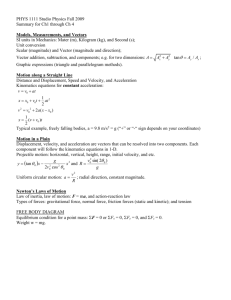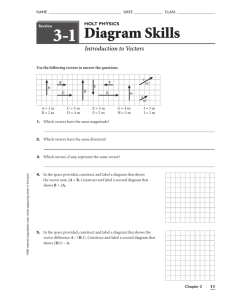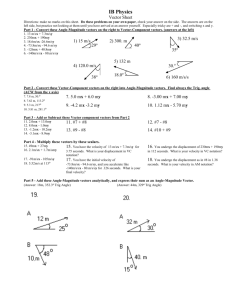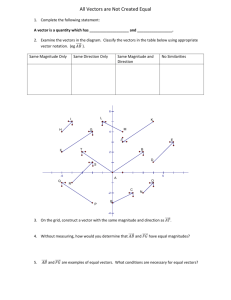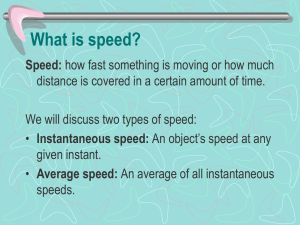Describing Motion: Kinematics in One Dimension
advertisement
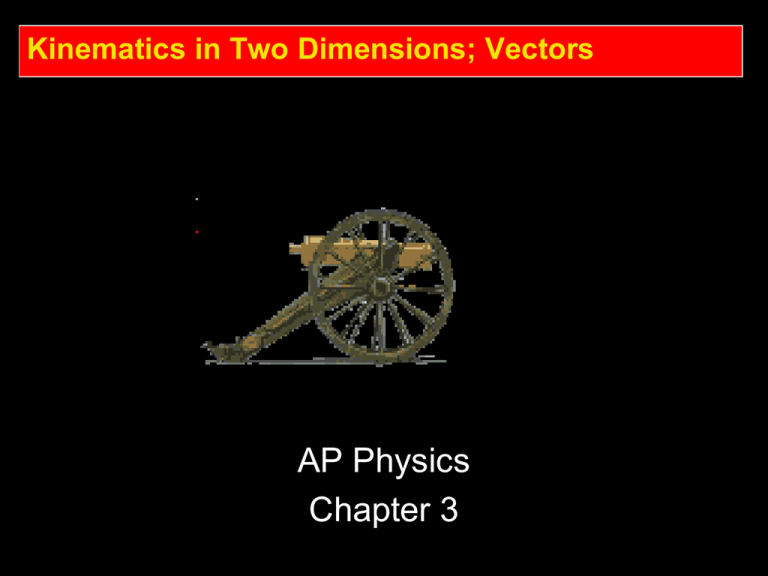
Kinematics in Two Dimensions; Vectors AP Physics Chapter 3 Standard IA2a Students should be able to add, subtract, and resolve displacement and velocity vectors Kinematics in Two Dimensions; Vectors add, subtract, and resolve displacement and velocity vectors AP Physics Section 3-1 Vectors and Scalars Kinematics in Two Dimensions; Vectors add, subtract, and resolve displacement and velocity vectors Vectors – magnitude and direction Draw using arrows Length represents magnitude Direction Represent by a boldface symbol with an arrow of the top v 3-1 Kinematics in Two Dimensions; Vectors add, subtract, and resolve displacement and velocity vectors AP Physics Section 3-2 Addition of Vectors-Graphical Method Kinematics in Two Dimensions; Vectors add, subtract, and resolve displacement and velocity vectors Used for estimating results To verify validity of calculated results Head to Tail Method Draw first vector to scale, direction is angle from x axis. Draw next vector from the end of first. After all vectors are drawn, draw a vector from start of original to end of final 3-2 Kinematics in Two Dimensions; Vectors add, subtract, and resolve displacement and velocity vectors Parallelogram method Construct a parallelogram using the two vectors to be added. Draw a vector as the diagonal starting at the same origin as the vectors you are adding 3-2 Kinematics in Two Dimensions; Vectors add, subtract, and resolve displacement and velocity vectors Note Resultant Vector – the sum of the vectors Label the vectors with a symbol The Resultant Vector is labeled R Always give a direction for the vector (angle from positive x axis) 3-2 Practice Drawing Vectors add, subtract, and resolve displacement and velocity vectors 3-2 Kinematics in Two Dimensions; Vectors add, subtract, and resolve displacement and velocity vectors AP Physics Section 3-3 Subtraction of Vectors and Multiplication of a Vector by a Scalar Kinematics in Two Dimensions; Vectors add, subtract, and resolve displacement and velocity vectors To subtract a vector you add the negative of that vector The negative of a vector has the same magnitude, but opposite (180o difference) direction 3-3 Kinematics in Two Dimensions; Vectors add, subtract, and resolve displacement and velocity vectors To multiply by a scalar, the magnitude is multiplied, the direction stays the same. If multiplied by a negative scalar, the direction is opposite. 3-3 Kinematics in Two Dimensions; Vectors add, subtract, and resolve displacement and velocity vectors AP Physics Section 3-4 Adding Vectors by Components Kinematics in Two Dimensions; Vectors add, subtract, and resolve displacement and velocity vectors First resolve the vector into its components The length in the x axis, and the length in the y axis 3-4 Kinematics in Two Dimensions; Vectors add, subtract, and resolve displacement and velocity vectors Using trig, we can solve for the sides of a right triangle One side is on the x-axis, one on the y-axis The vector becomes the hypotenuse 3-4 Kinematics in Two Dimensions; Vectors add, subtract, and resolve displacement and velocity vectors If the vector is named A Using the equation for the adjacent side we solve for the x component of the vector 3-4 Kinematics in Two Dimensions; Vectors add, subtract, and resolve displacement and velocity vectors adjacent cos hypotenuse Ax cos A Ax A cos 3-4 Kinematics in Two Dimensions; Vectors add, subtract, and resolve displacement and velocity vectors Same logic for y component opposite sin hypotenuse Ay sin A Ay A sin 3-4 Kinematics in Two Dimensions; Vectors add, subtract, and resolve displacement and velocity vectors Each vector is resolved into it’s components You must be consistent with your x/y axis Now we add all of the components in the x with each other Then all of the components in the y with each other 3-4 Kinematics in Two Dimensions; Vectors add, subtract, and resolve displacement and velocity vectors We are calculating the total change in the x and the y 3-4 Kinematics in Two Dimensions; Vectors add, subtract, and resolve displacement and velocity vectors We then know the components of the resultant vector 3-4 Practice Resolving Vectors add, subtract, and resolve displacement and velocity vectors 3-2 A-8 A flashy hog of dubious lineage runs at 45 m/s and an angle of 37o to the x axis. What is the x-component of his velocity? What is the ycomponent? Kinematics in Two Dimensions; Vectors add, subtract, and resolve displacement and velocity vectors The equation for the components of the resultant Rx Ax Bx Ry Ay By 3-4 Kinematics in Two Dimensions; Vectors add, subtract, and resolve displacement and velocity vectors Now we will use the Pythagorean theorem to calculate the magnitude of the Resultant vector 2 2 2 c a b R R R 2 2 x 2 y R R R 2 x 2 y 3-4 Kinematics in Two Dimensions; Vectors add, subtract, and resolve displacement and velocity vectors The direction is given as an angle from the positive x-axis, calculate using tangent function opposite tan adjacent Ry tan Rx Ry tan Rx 1 3-4 Kinematics in Two Dimensions; Vectors add, subtract, and resolve displacement and velocity vectors The only time you have to think is if the xcomponent is negative The angle you calculate will be in measured from the negative x-axis In that case, add 180o to your angle to insure that it is measured from the positive x-axis Unless otherwise noted, all angles will be given from the positive x-axis with counterclockwise being the positive direction 3-4 Practice Adding Vectors add, subtract, and resolve displacement and velocity vectors 3-2 Kinematics in Two Dimensions; Vectors understand the motion of projectiles in a uniform gravitational field AP Physics Section 3-5 Projectile Motion Standard IA2c Students should understand the motion of projectiles in a uniform gravitational field. Kinematics in Two Dimensions; Vectors understand the motion of projectiles in a uniform gravitational field Projectile – object moving through space under the influence of gravity 3-5 Kinematics in Two Dimensions; Vectors understand the motion of projectiles in a uniform gravitational field We will deal with the projectile after it is launched and before it hits the ground We will analyze horizontal and vertical components separately 3-5 Kinematics in Two Dimensions; Vectors understand the motion of projectiles in a uniform gravitational field In the y-axis the projectile accelerates at 9.80m/s2 This is independent of the shape or mass of the object (we ignore air friction) 3-5 Kinematics in Two Dimensions; Vectors understand the motion of projectiles in a uniform gravitational field It is also independent of any motion in the x-axis 3-5 Kinematics in Two Dimensions; Vectors understand the motion of projectiles in a uniform gravitational field We use all the equations for motion with constant acceleration in the y-axis In the x axis, the projectile does not accelerate (if we ignore air friction) 3-4 Kinematics in Two Dimensions; Vectors understand the motion of projectiles in a uniform gravitational field The only motion equation for the x-axis is then vx x t When we combine these actions we get an object moving as a projectile Click for Simulation 3-4 Kinematics in Two Dimensions; Vectors understand the motion of projectiles in a uniform gravitational field AP Physics Section 3-6 Solving Problems Involving Projectile Motion Kinematics in Two Dimensions; Vectors understand the motion of projectiles in a uniform gravitational field Steps in problem solving 1. Draw a diagram 2. Choose an origin and xy coordinate system 3. Choose a time interval a. Only while the object is in flight b. Must be the same for the x and y axis c. This is the only value that is the same for the x and the y 3-6 X-Axis Kinematics in Two Dimensions; Vectors t= understand the motion of projectiles in a uniform gravitational field Vx= Y-Axis t= Vy0= Steps in problem solving X= Y= 4. Break given values into x and y a=-9.80m/s2 Vy= components 5. List the known and unknown quantities in the x and in the y a. Acceleration in the y is -9.80m/s2 b. No acceleration in the x 6. Stop and think before solving the problem, visualize the Physics occurring. 3-6 Practice with Projectile Motion understand the motion of projectiles in a uniform gravitational field 3-6 A-9 A highly trained attack squirrel jumps off a cliff that is 25 m tall (assume initial velocity of zero). Two Seconds later, the rest of his team jumps off. What must be their initial velocity so they all land at the same time? Practice with Projectile Motion understand the motion of projectiles in a uniform gravitational field 3-6 A-10 A cow accidentally dances off a cliff that is 350 m tall. If she leaves the cliff with a velocity of 120m/s @ 72o, what is her final displacement when she hits the ground? Practice with Projectile Motion understand the motion of projectiles in a uniform gravitational field 3-6 A-11 A hamster dropkicks a walrus with an initial velocity of 312 m/s @ 62o. A. What is the maximum height that the walrus reaches? B. What is the velocity at this point? C. What is the acceleration at this point? Practice with Projectile Motion understand the motion of projectiles in a uniform gravitational field 3-6 A-12 A cute cuddly kitten shoots a hi-powered rifle out his window at the mean dog next door. If the gun is held level 2.5 m above the ground and shoots a bullet with an initial velocity of 1000 m/s, how far will the bullet travel before it hits the ground? Practice with Projectile Motion understand the motion of projectiles in a uniform gravitational field 3-6 A-13 A gopher is out worshipping the sun god, when a bird swoops down and grabs him. The bird is climbing with a velocity of 55 m/s @ 62o when he drops the gopher. If the gopher was 25 above the ground at the time, with what velocity does he strike the soft heather? Practice with Projectile Motion understand the motion of projectiles in a uniform gravitational field 3-6 A-9 Test Day Happy Dance A-7 A cat jumps off a ski slope that is 14.5 m above the ground. If his launch velocity is 35 m/s @ 40o A. How long is he in the air B. How far down range does he get C. What is his velocity at the maximum height? A-10 A dog is driving down the road at 45 m/s with his head out of the window. If he shoots a large dog biscuit out of the right window with a velocity of 25 m/s and a height of 1.2 m, how far from the car will it land? A-13 A very sad looking rabbit is thrown upward with an initial velocity of 200 m/s @ 72o. What is the maximum height he reaches? What is his velocity at that maximum height?

